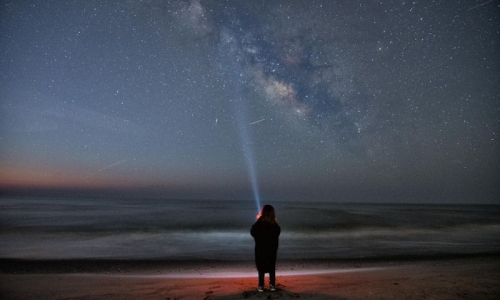Have you ever wondered how an all-powerful God could let people die of starvation or lack of clean water? If God actually exists, and He is a good God, why would He allow such suffering and injustice? We read in the Bible about times when God provided miraculously, but why would He not do this every time? So He loves us enough to send His only son to die for us, but He does not love us enough to step in and fix our problems on earth? Is He faithful to provide our daily needs or not? When Jesus died, we received the hope of heaven . . . but are we meant to simply endure the difficulties of this world until we get there?
I know these questions plague many people, and can even be the factor that impedes their belief in God. There can be a discrepancy between our experience of God and our understanding and expectations of Him. However, the Bible teacher, Shane Willard, points out that God has not withheld the resources to fix the world. If he had done that, then maybe we could blame Him for negligence. According to Forbes magazine, the richest 40 people in the world have 1.4 trillion dollars. This is enough money to put clean water and adequate sanitation in the whole world, to start educating the whole world, and vaccinate and feed the whole world (while still leaving them billionaires). God did not fail – man did. But thankfully, Scripture assures us this is not the end of the story.
After first hearing those statistics, I thought, “If I had that much money, I would use it to help others.” But it is not my business what other people do with their money, time, and gifts . . . but rather what will I do with mine. Shane explains, in the kingdom, “God does not look at the sum of things we have done or given; He looks at the ratio of what we have done with what we have been given” (Luke 21:1-4).
Don't let what you cannot do interfere with what you can do. - John Wooden
Shockingly, I learned that if you own a car you are part of the richest 10% of the world. According to Milanovic’s book, The Haves and the Have-Nots, earning $34,000 a year puts you in the top 1% of the wealth of the world, and earning $70,000 a year puts you in the top 0.1%. When I compare myself to others in my little Mount Pleasant, SC setting, I do not think of myself as rich. But if I put things in proper perspective, I am filthy rich . . . and much is expected of me (Luke 12:48).
1 John 3:17 states, “If anyone has material possessions and sees a brother or sister in need but has no pity on them, how can the love of God be in that person?” If true religion is really taking care of the widows and the orphans (James 1:27), and defending the cause of the oppressed (Isaiah 1:17), what am I doing about it?
Years ago, John Piper preached a sermon titled, “Don’t Waste Your Life.” He shared about two women in their 80’s who were serving out their retirement as missionaries in Africa - they had recently run their car off the road and died. Though most people would deem this incident a tragedy, Piper challenged this line of thinking. He contrasted their story by sharing about a different couple that is spending their retirement on their yacht and collecting seashells - Piper says . . .
There are hundreds of you — you don’t care whether you make a lasting difference for something great, you just want people to like you . . . Or if you could just have a good job with a good wife and a couple good kids and a nice car and long weekends and a few good friends, a fun retirement, and a quick and easy death and no hell — if you could have that, you’d be satisfied even without God. That is a tragedy in the making.
When I first read Piper’s article, I thought “Whoa, that sounds a lot like me.” A life of comfort and happiness (that ends with heaven) always seemed like a sensible goal. Growing up, I was taught that in order to go to heaven, all I had to do was ask Jesus into my heart. A simple prayer would make me a Christian and save me from the eternal torment of hell. It sounded like a good deal to me - so I was in!
But later in life, I realized inviting Jesus to be my Savior was not the same thing as making Him my Lord (James 2:19). Scripture admonishes us to make more disciples of the nations, not more believers . . . and there is a big difference between the two (Matthew 28:19-20). In reality, my salvation was only the beginning of my journey with God; I had a lifetime of learning and growing ahead of me. The truth is, God did not save us just so we could go to heaven; He saved us so we could be transformed into His likeness and bring heaven to every place of hell here on earth.
Though we are not saved BY good works, we are saved FOR them (Ephesians 2:8-10). Truly we are the recipients of God’s grace; through the finished work on the cross, Jesus reconciles us to God and secures our salvation. But THEN we move forward to take hold of all He has given us . . . and this is where it gets exciting (John 17:10)!
The work of salvation, in its full sense, is (1) about whole human beings, not merely souls; (2) about the present, not simply the future; and (3) about what God does through us, not merely what God does in and for us. ― N.T. Wright
Jesus invites us to a life of abundance found in Him, but He never promised us “the American dream.” On the contrary, Jesus exhorted people to “count the cost” first . . . because following Jesus meant walking away from their former life, dying to self, and suffering on His behalf (Luke 14:25-33, Mark 10:17-31, Luke 9:59-62, 2 Timothy 3:12, Mark 13:13, Philippians 1:29). But why would anyone choose that?
Because our deepest happiness is not found in pursuing comfort. We can look at Hollywood and see that. As Alisa Keeton writes in her book “Revelation Wellness,” “God has better plans for us than just giving us comfort. He wants us to have shalom, which is a Hebrew word for ‘completeness, soundness, welfare, and peace.’”
Satan wants us to believe that this is the good life, but the abundant life is actually discovered when we give ours away (Luke 17:33). When we deny ourselves and “pick up our cross” to follow Him,” we join the dance with the trinity . . . and there is no other joy like it on this earth (Matthew 16:24). Here we discover that a life of shalom is far more fulfilling than a life of mere comfort.
As the late missionary Jim Elliot said, “He is no fool who gives what he cannot keep to gain what he cannot lose” (Mark 8:36).
In The Screwtape Letters, C.S. Lewis writes a fictional account of a senior devil instructing his nephew in the techniques of tempting people away from God. He tells his nephew that the objective is not to make the people wicked, but to make them indifferent. I believe this indifference is the tragedy Piper references. In his book, A Hunger for God, Piper writes . . .
Dwight Moody warned us years ago, “Our biggest fear should not be failure, but at succeeding at things that don’t really matter.” God is longing to give us the nations (Psalms 2:8), but many of us are content with cupcakes and Facebook. I know I was. I was indifferent to other people’s suffering because I lived a sheltered life of comfort, and indifferent to sharing my faith because I was content with my “Christian” routine of going to church and Bible study.
My pastor Steve Wood recently taught on the difference between intellectual faith and volitional faith. He explained that for faith to be authentic, one’s life must testify to those beliefs; the “action” element is critical. Volitional faith is the faith that justifies, the one that actually results in a transformed life.
When we truly encounter the love of Christ, we are transformed . . . and our obedience to Him naturally flows out of that love, not out of duty. His goodness compels us to action. Zacchaeus is a great example of this. Jesus invited him into a relationship, and Zacchaeus responded by giving away half his possessions to the poor and paying back all the people he had defrauded. Jesus assured him salvation had come to his house that day . . . but Zacchaeus was not saved through his charity - His actions were simply outward evidence of the inward change in his heart (Luke 19:8-10). His encounter with love incarnate left him forever changed.
The Hebrew word for “hear” or “listen” is “shema,” and it means more than just processing sound with our ears. Shema means to listen AND obey, to take heed and do what is asked. When Jesus said, “He who has ears let him hear,” He was calling the people to action, to be doers of the Word (Matthew 13:9, James 1:22-25). This is volitional faith. As John Wimber put it, "The kingdom is about doing just as much as teaching. If you aren't doing the works of the kingdom; the message isn't complete."
We were made to be a part of something bigger than ourselves, and because of this, our greatest joys will never be found in the pleasures of this world - they are discovered as we abandon ourselves to the adventure of following God. Only then will we discover our divine purpose, and enter into the joy of our Master (Matthew 25:21). I believe this is what Irenaeus meant when he said, "The glory of God is a human being fully alive."
As William Wallace said, "Every man dies. Not every man really lives." To REALLY live, we must run our race as if we are running to "win the prize" (1 Corinthians 9:24).

Kadima is the Hebrew word for moving forward, for getting up and going. It means “Let’s go!” or “Come on!” It is the type of word that a commander would use to urge his troops forward, or that a mother would use to motivate her child to get moving. In some places, Hebrew-speaking sports fans even use the word to cheer on their teams by yelling “Kadima!” from the sidelines. It has a sense of action, drive, and forward movement.
We are citizens of another kingdom, exiles on earth for a short season, and we have this one little life of ours to do something (Philippians 3:20-21). So let’s not bury our talents any longer – let’s take hold of the eternal life to which we were called, and make the most of all our days (Ephesians 5:15-16). Freely we have received; freely we must give (Matthew 10:8).
My brothers and sisters in Christ, there is a huge harvest waiting to be reaped (Matthew 9:37); let us put away our hesitation and procrastination . . . KADIMA!
NOTE:
I want to make something very clear - if you accept Christ as your Savior, but spend your whole life focusing on the comforts and pleasures of this world, God will love you NO LESS than someone who does the opposite. He is absolutely crazy about you, and what you do or don't do will never change that (Romans 8:31-39). The downside of this scenario is not God's response to your choices; rather, it is missing out on the joy of partnering with God to further His kingdom on earth. This is why my dad used to tell me he had mixed emotions about deathbed conversions - the sad part was this individual never got to experience a life full of Christ's presence and purpose.
I recognize this article could put some people off – people who work hard for their money and already give in a lot of ways. This article is not meant to make you feel guilty for your wealth, or prevent you from enjoying the blessings of comfort in your life. Rather, it is meant as a reminder of our true purpose on earth (because it is so easy to get sidetracked by other messages in our culture). More than selling our possessions and taking a vow of poverty, God simply wants our friendship. And as we develop a deeper heart-connection with our Abba, He will stir up the desire within us to steward well the gifts and resources He has entrusted to us.
It is important to note that wealth is not innately bad; rather, it is the love of money that is the root of evil (1 Timothy 6:10). If we are spending all we have on our own pleasures, or connecting our security to a certain number in our bank account, then maybe we should take a second look. We get to choose our path in life, whether we are distinguished as lovers of pleasure, or as lovers of God (2 Timothy 3:1-5, Philippians 2:21).
In the New Testament there is no mention of a 10% tithe, only of sacrificial giving. Believers shared everything they had with anyone in need (Acts 4:32-35). If I am truly going to take God’s Word seriously, this Scripture challenges me! But the key is to start by doing something to help further God’s kingdom on earth, which may or may not include our finances. The sacrifice of our time and energy can be just as much a gift to others.
Can we agree to at least start somewhere? Maybe that means taking a meal to the new mom or widow in the neighborhood, or inviting the new neighbors over. Maybe it means speaking an encouraging word to the cashier at the grocery store, starting a Bible study with your co-workers, or volunteering in the nursery at church. We can make a difference in many meaningful ways outside of simply writing a check. As D.L. Moody once said, "We may easily be too big for God to use, but never too small."
Mother Theresa set a great example for us because she never looked at the masses as her responsibility; she looked at the individual. She knew she could only love and feed one person at a time. Mother Theresa was quick to point out that we do not make an impact by doing great things, but by doing “small things with great love.”
What you do in the present—by painting, preaching, singing, sewing, praying, teaching, building hospitals, digging wells, campaigning for justice, writing poems, caring for the needy, loving your neighbor as yourself—will last into God’s future. These activities are not simply ways of making the present life a little less beastly, a little more bearable, until the day when we leave it behind altogether. They are part of what we may call building for God’s kingdom. - NT WRIGHT
Matthew West sums it up well in his song, "Do Something"
Clip from John Piper's sermon “Don’t Waste Your Life”
Shane Willard's sermon "Somebody Buried Something"
John Piper audio clip "Does God Promise to Feed and Clothe Christians?"






